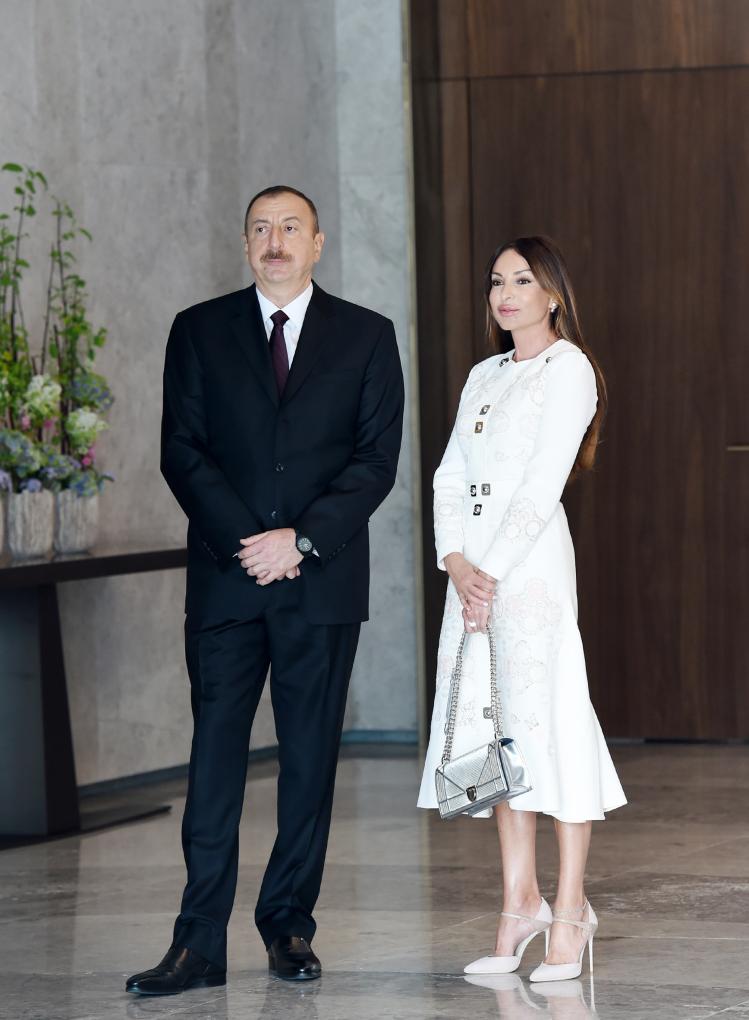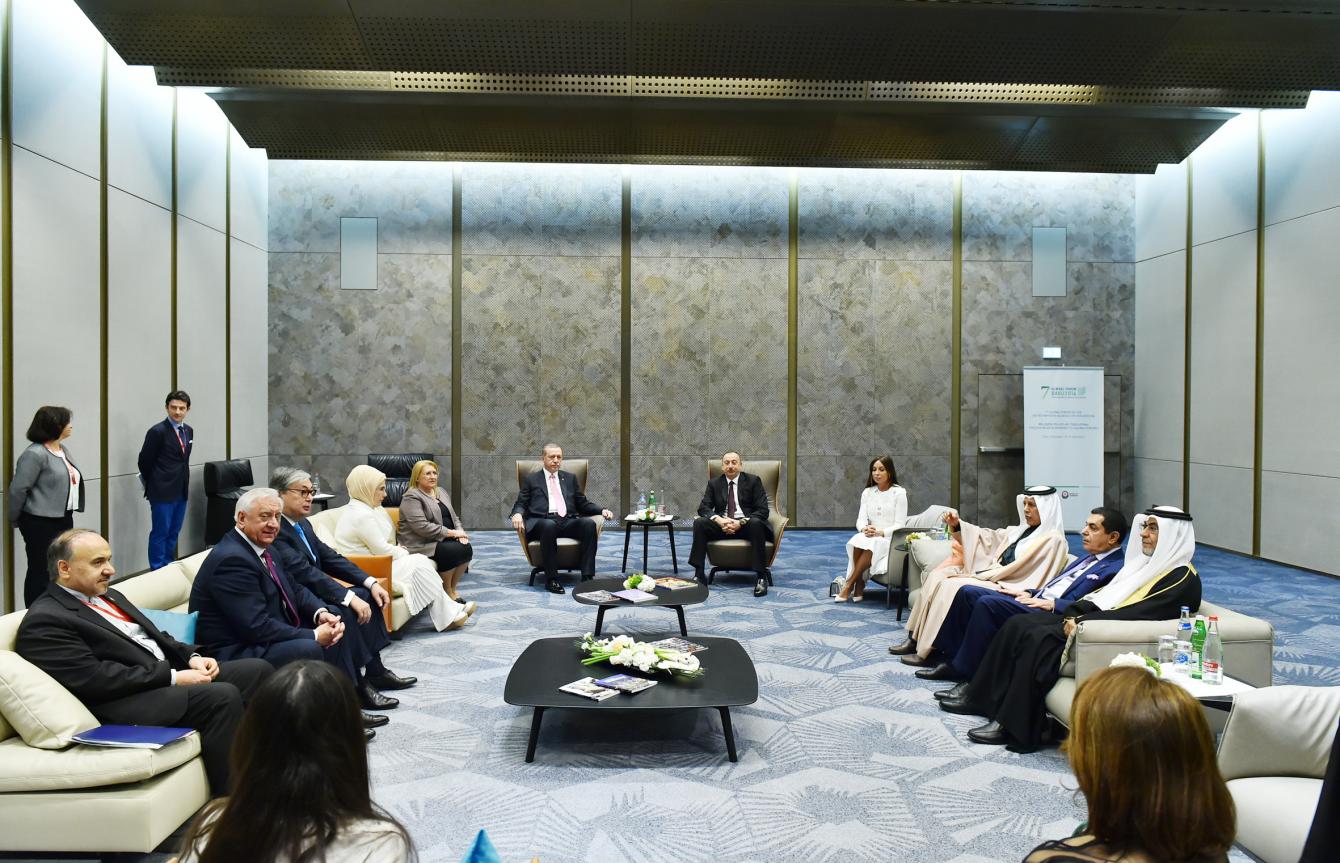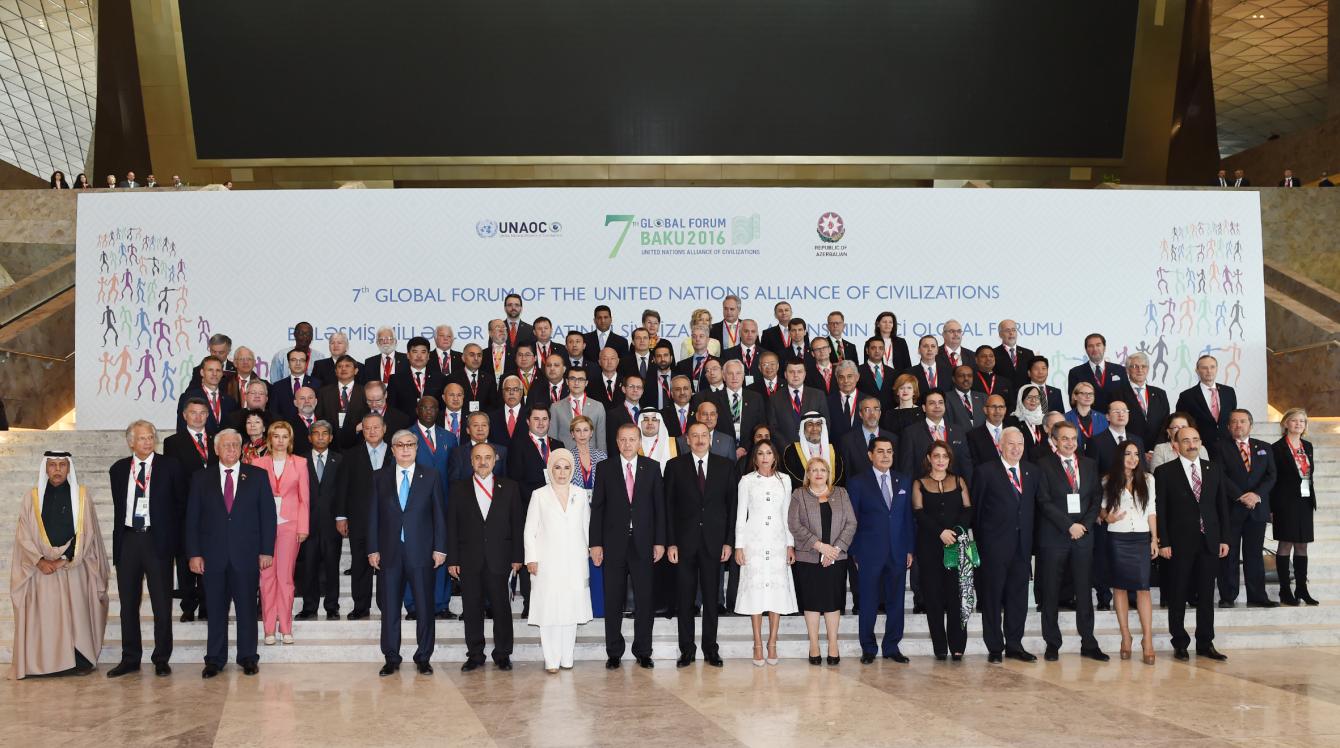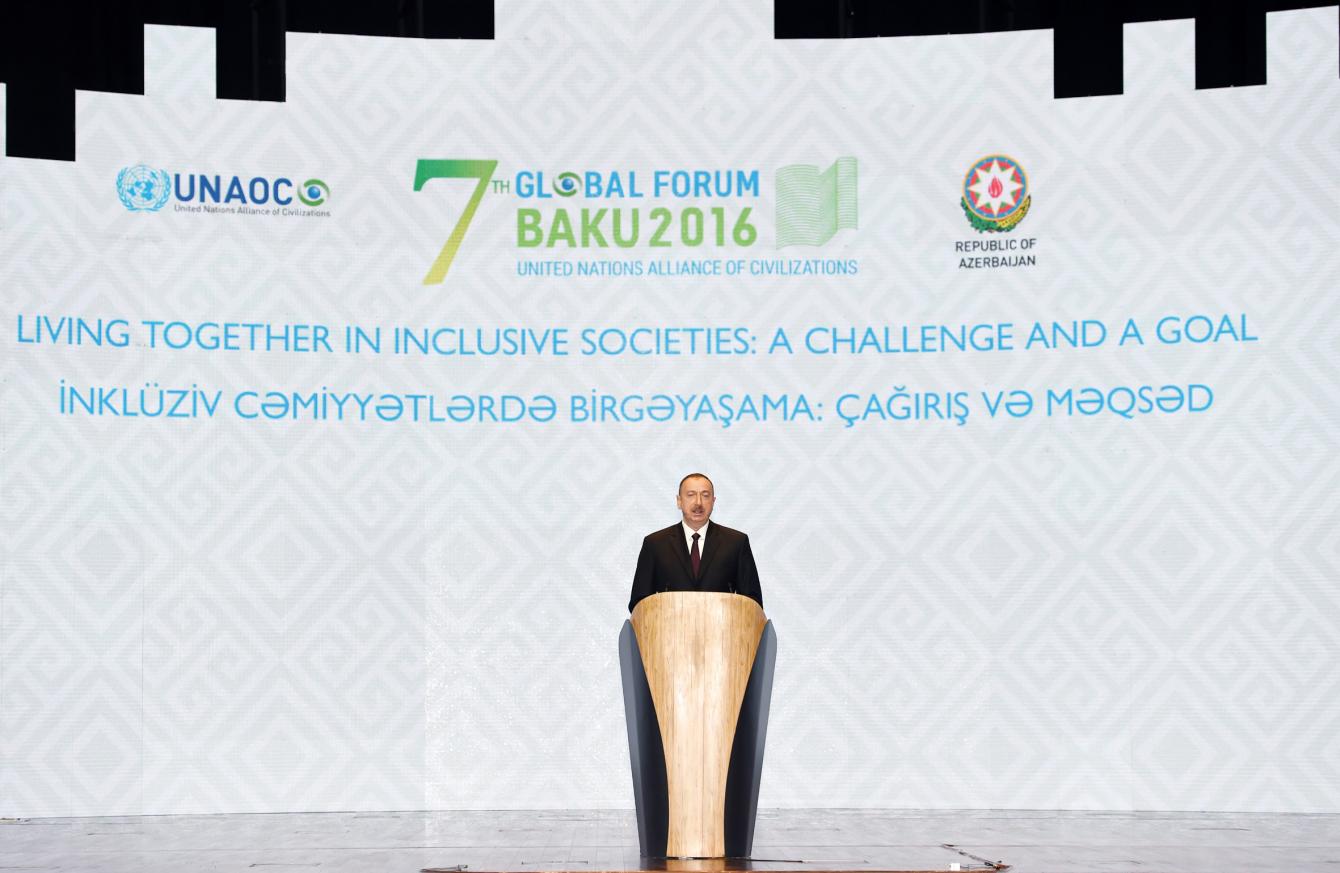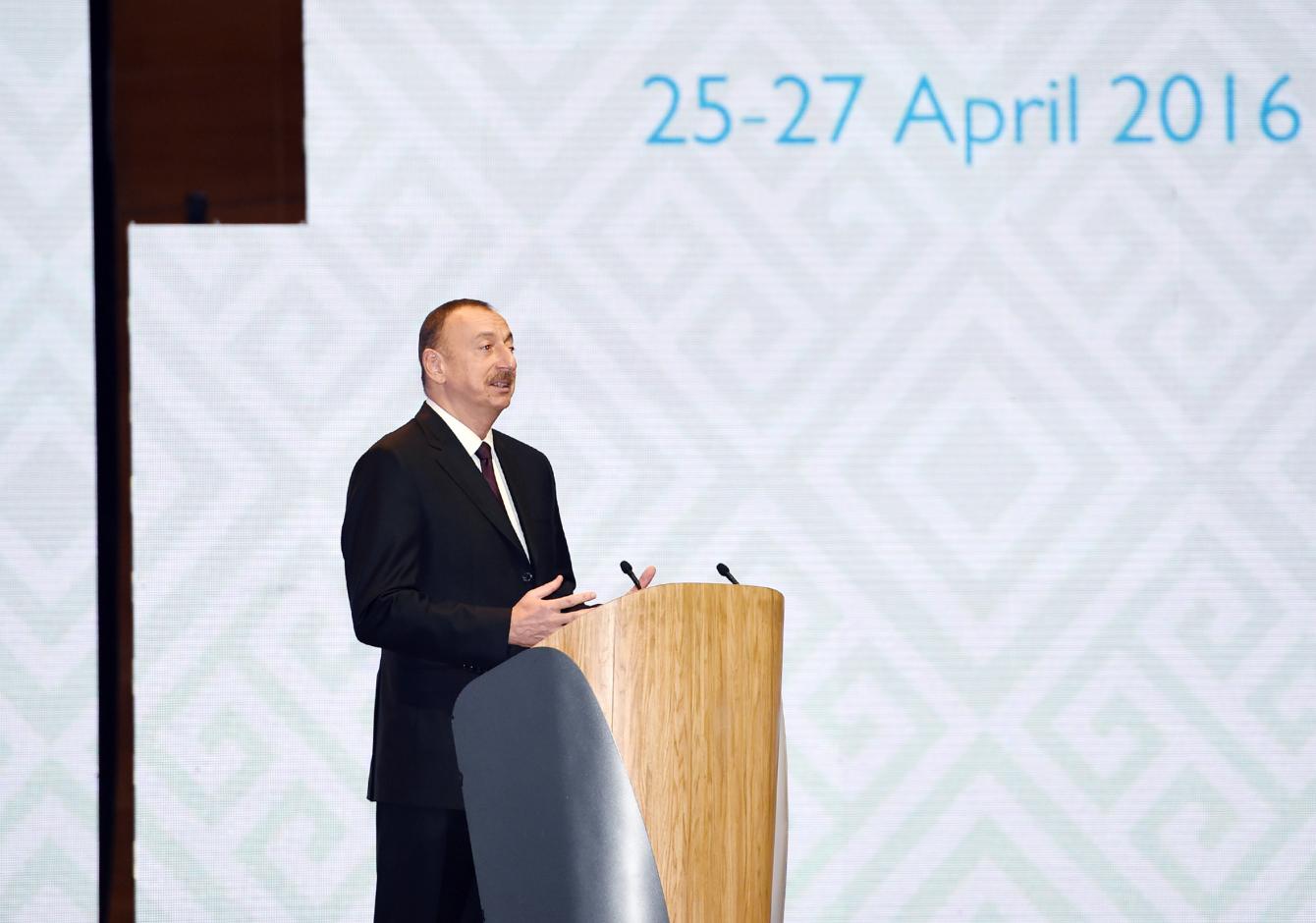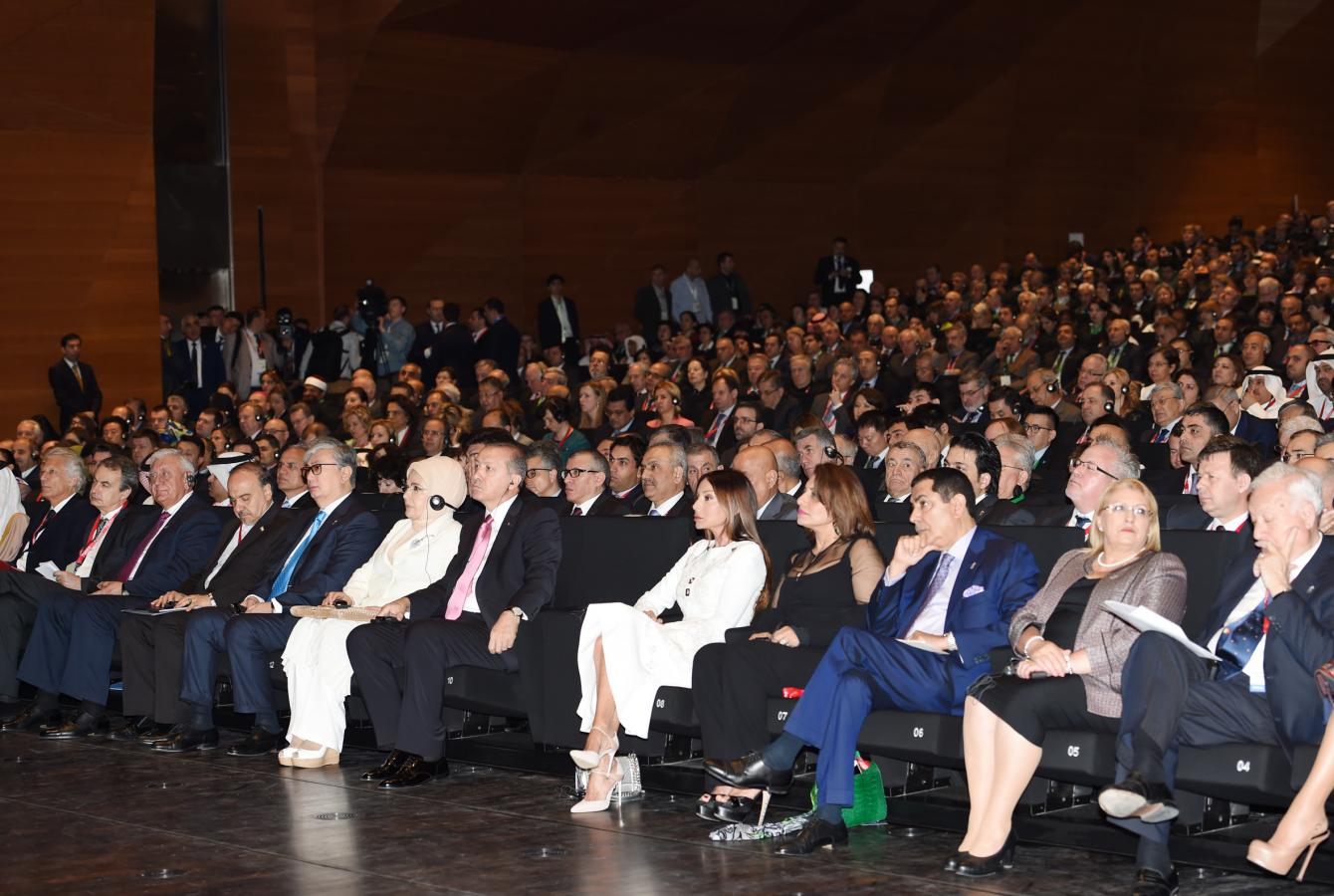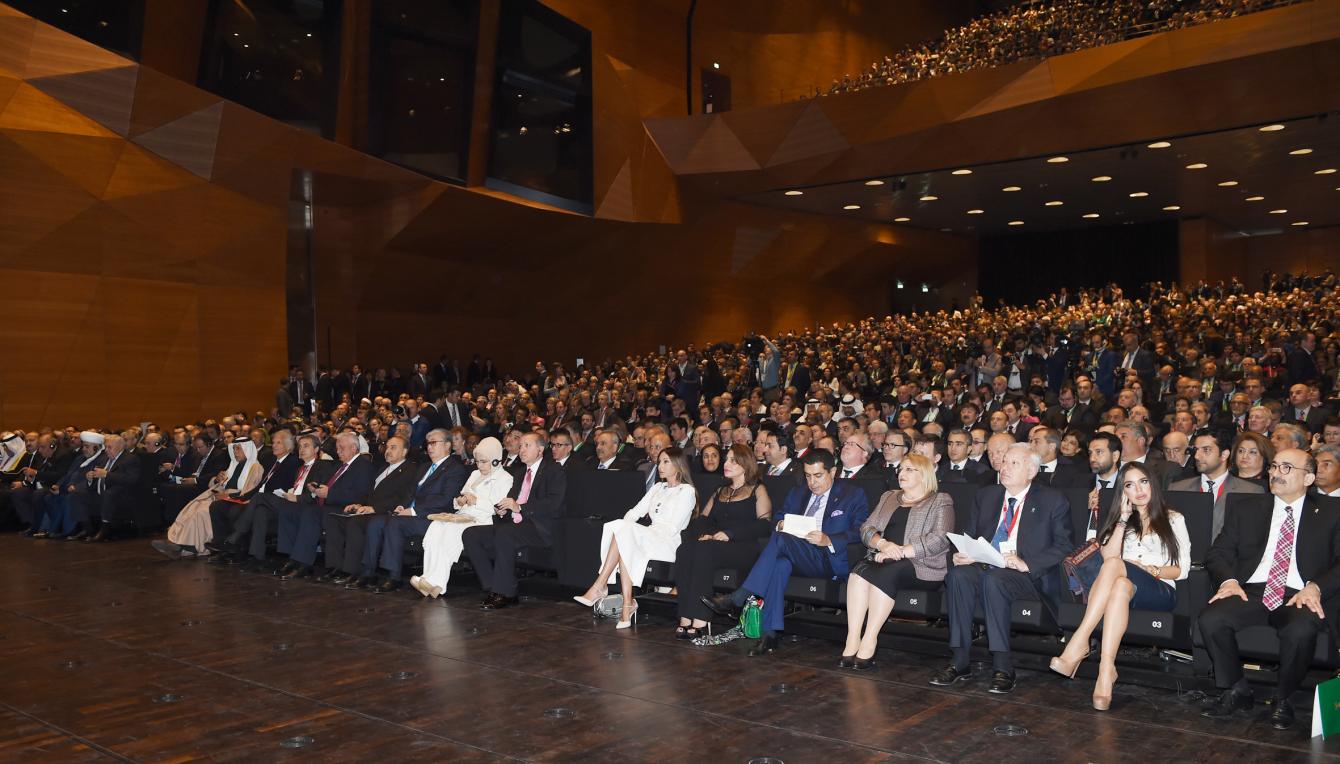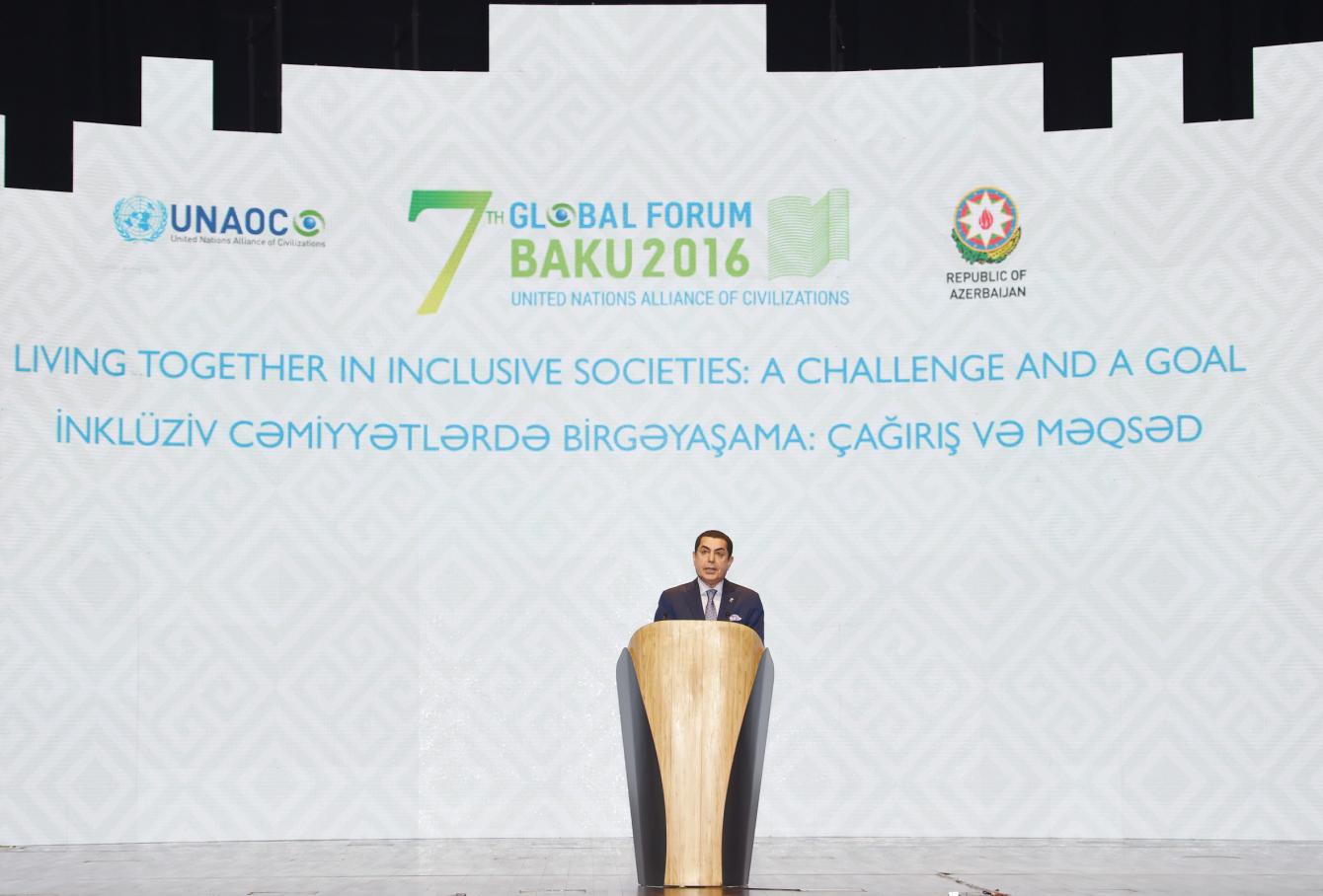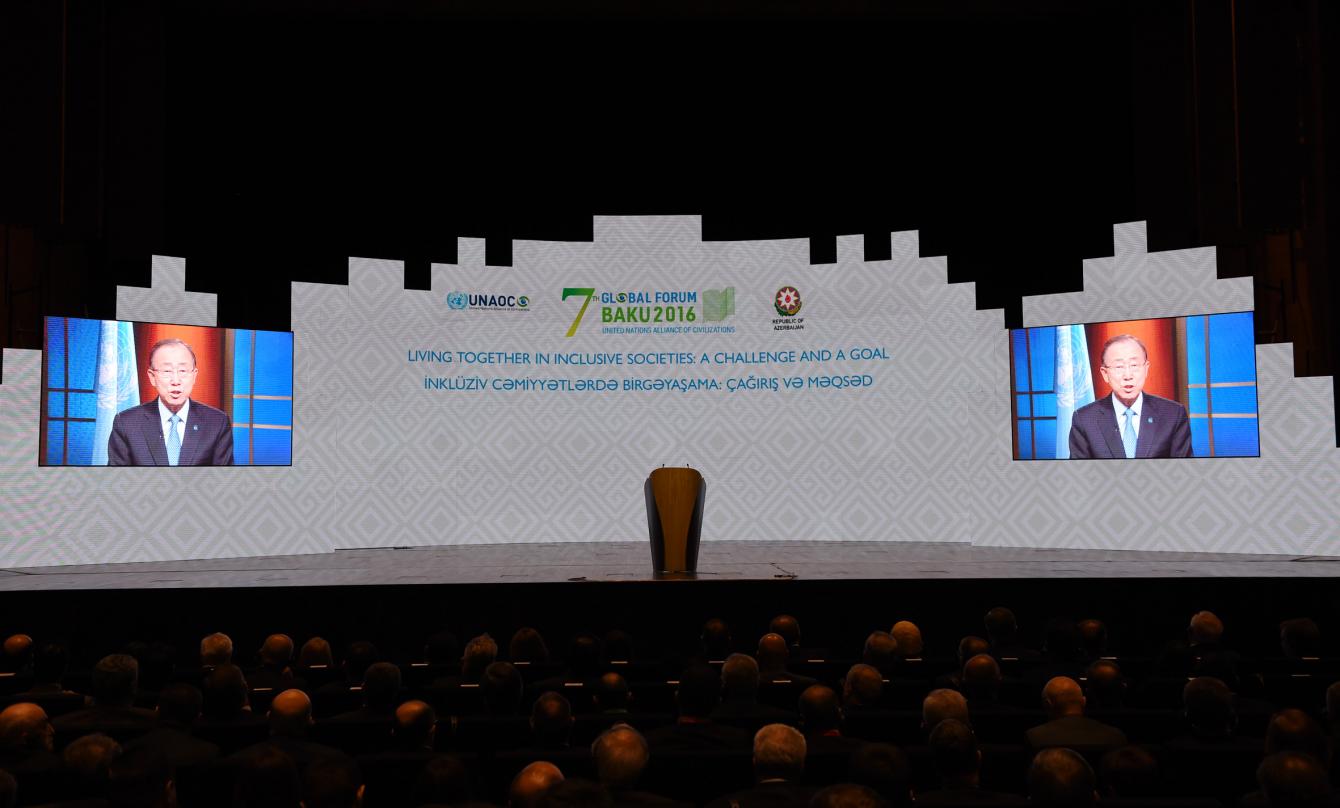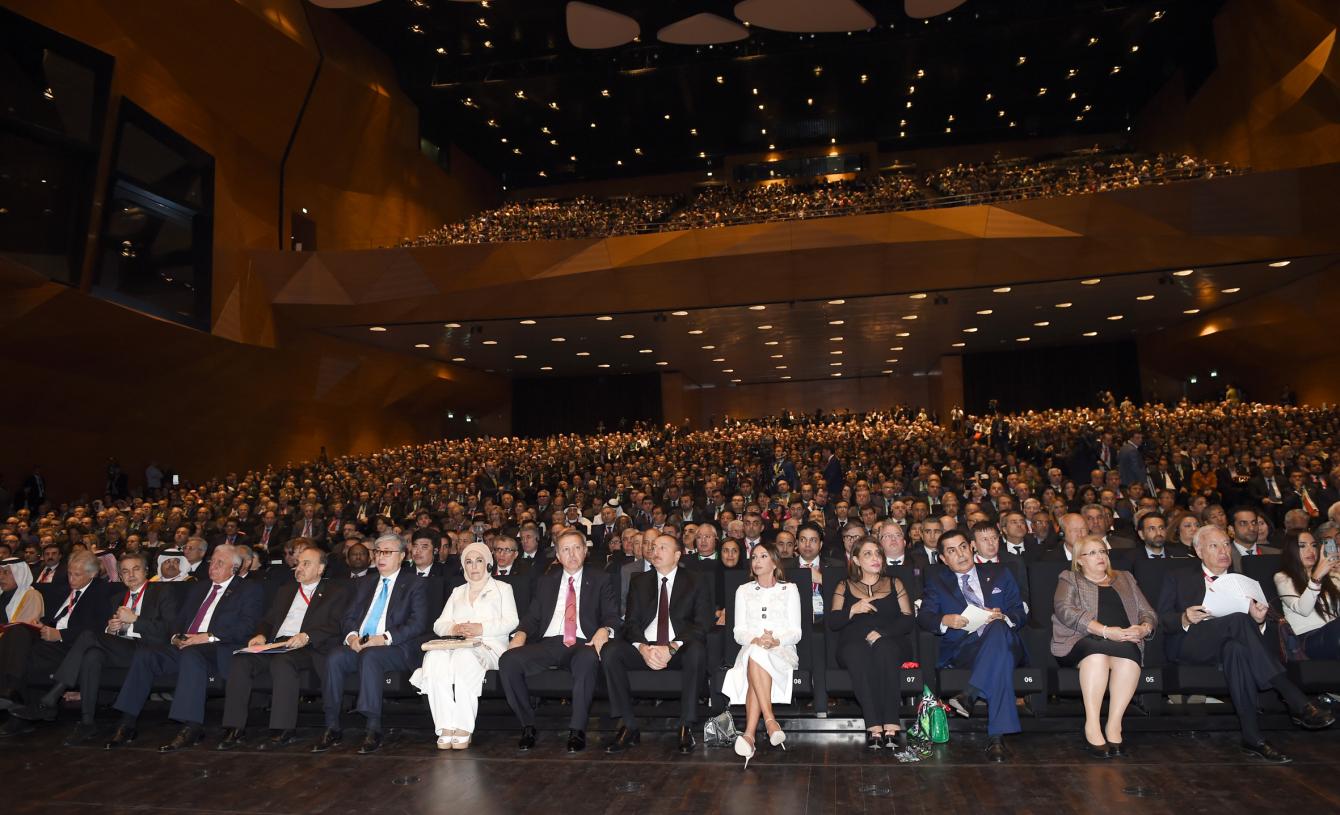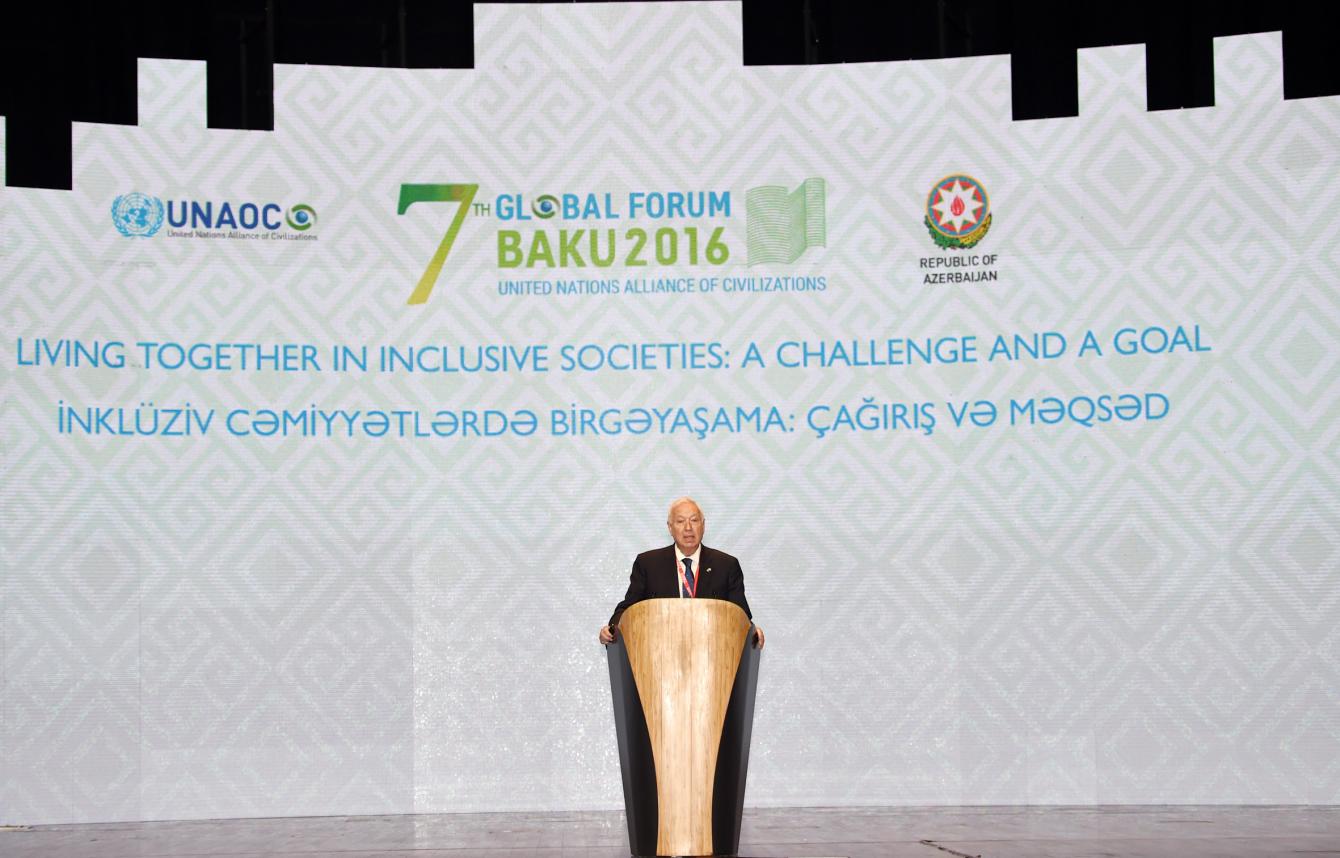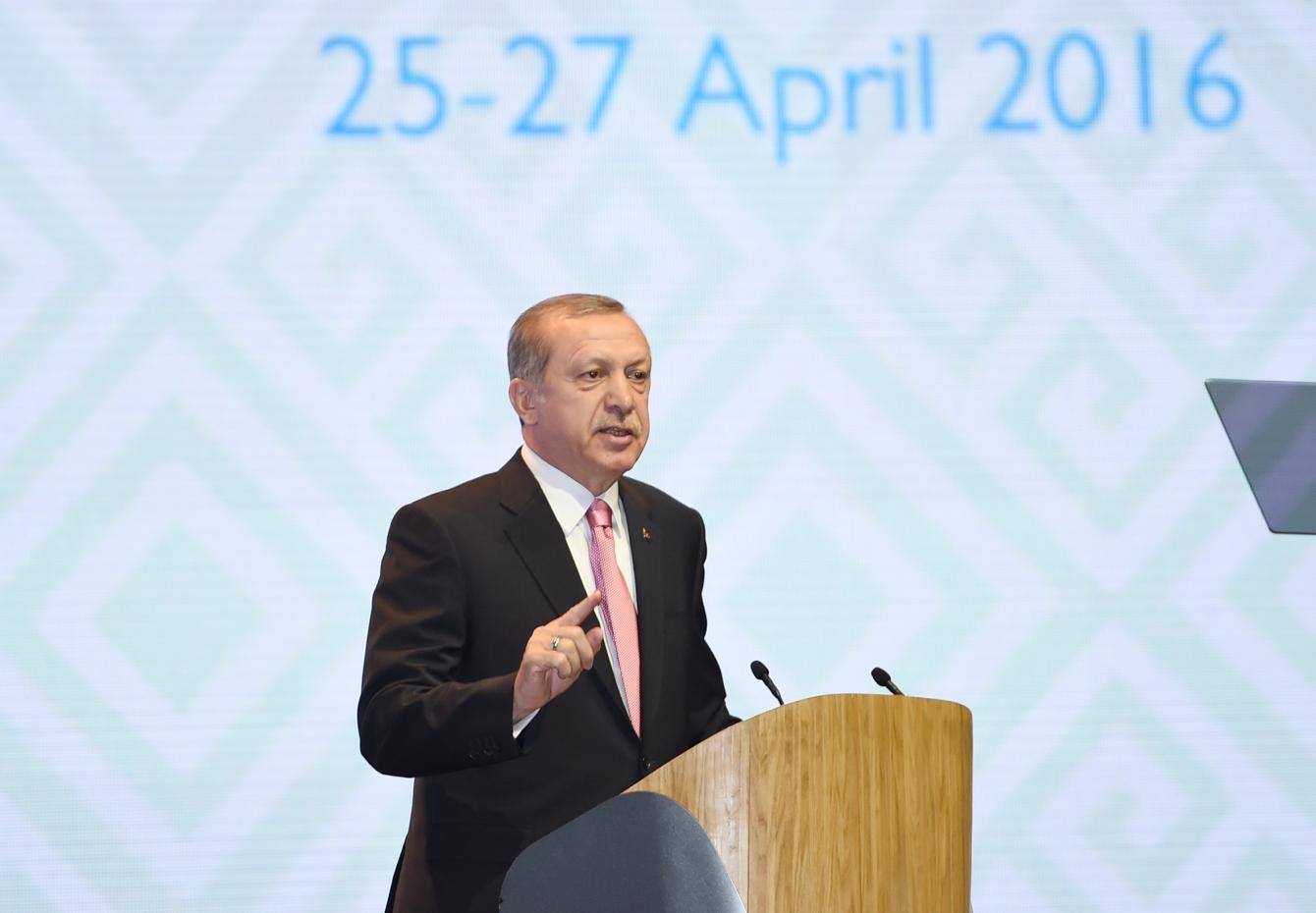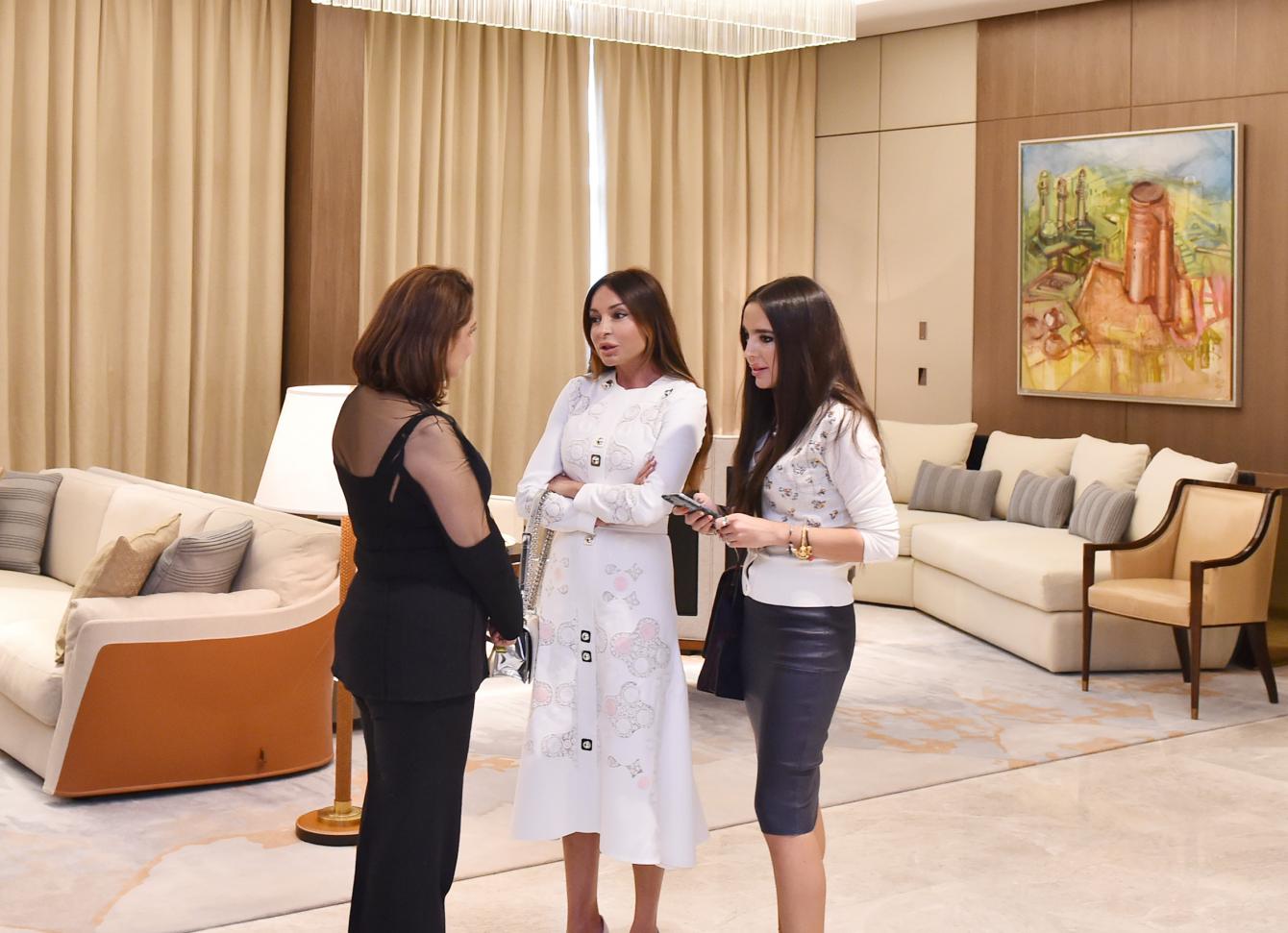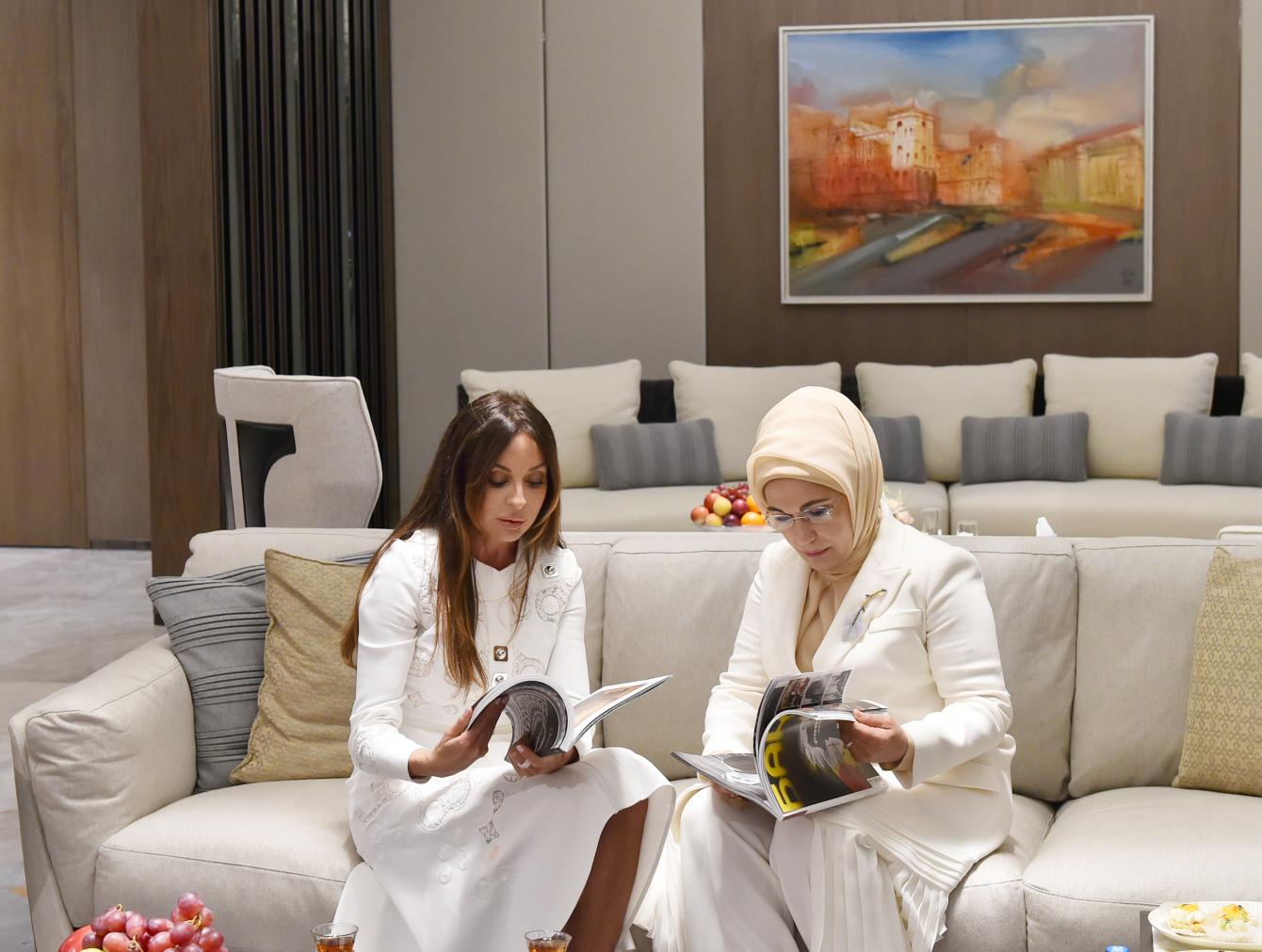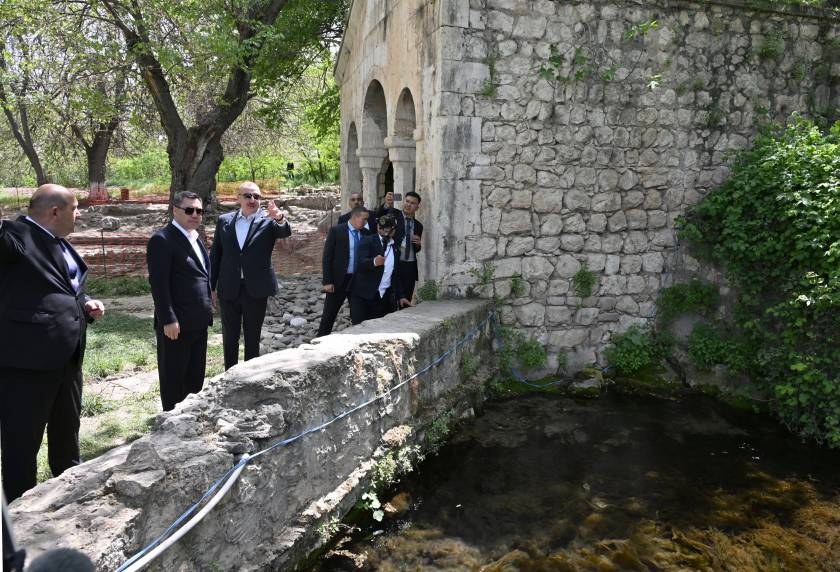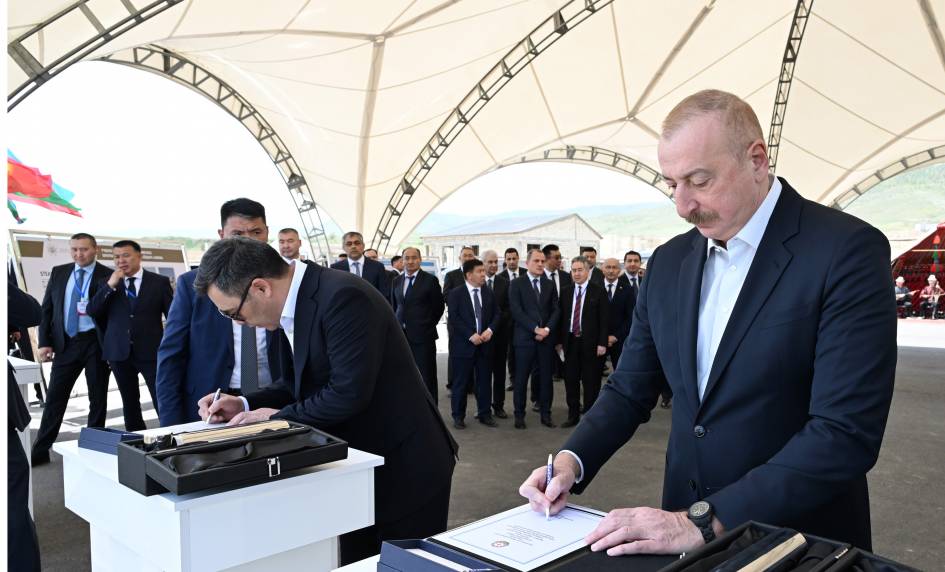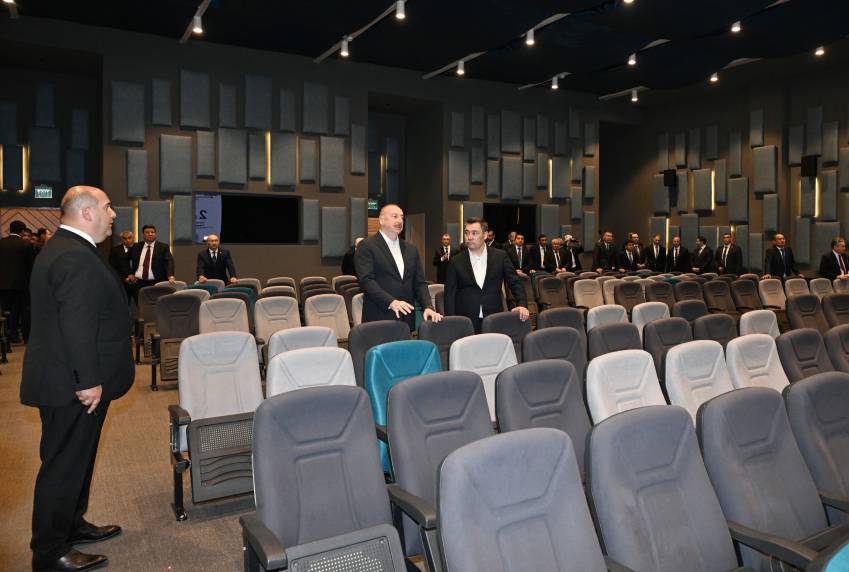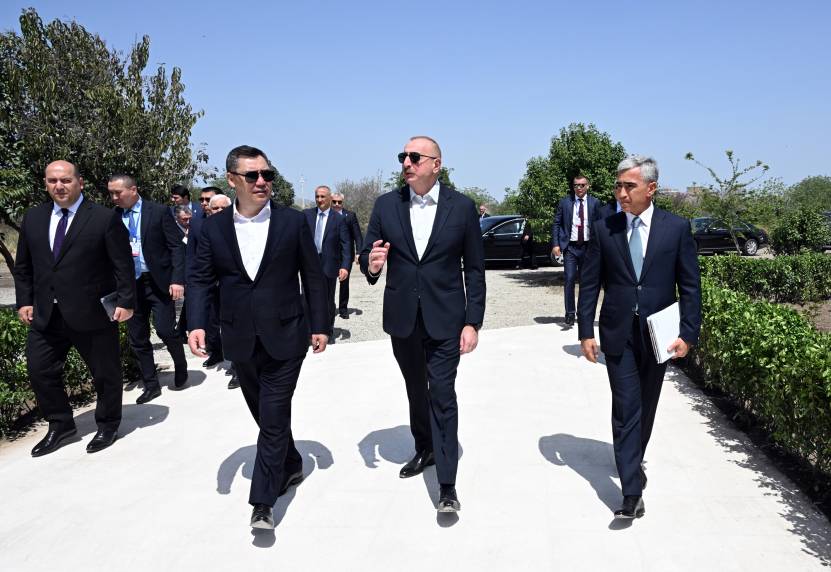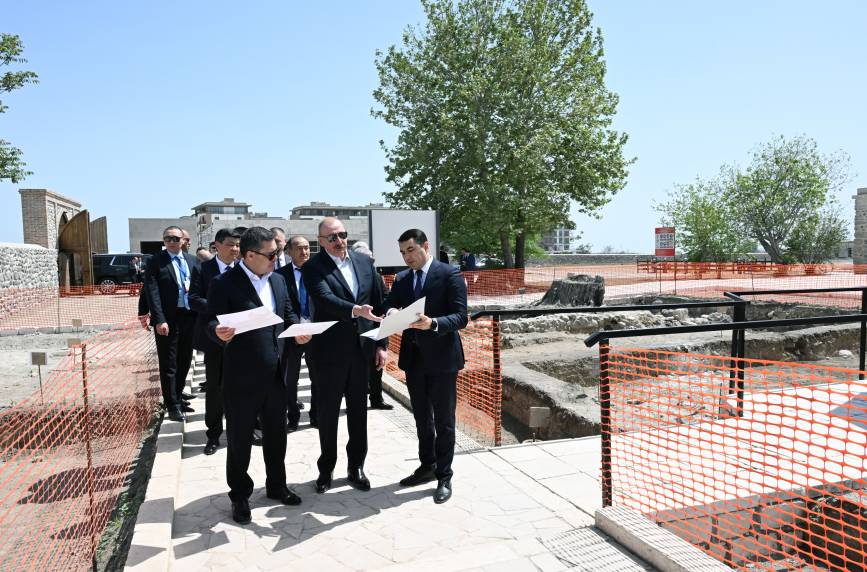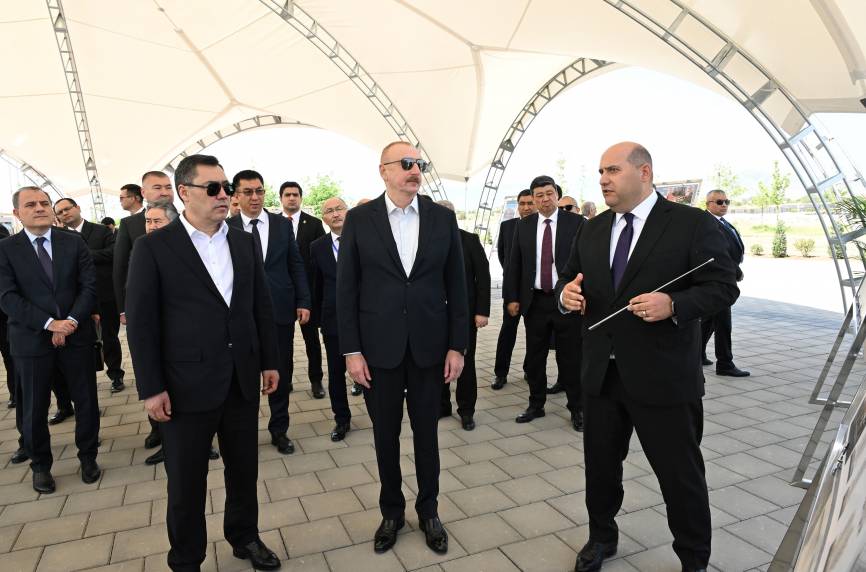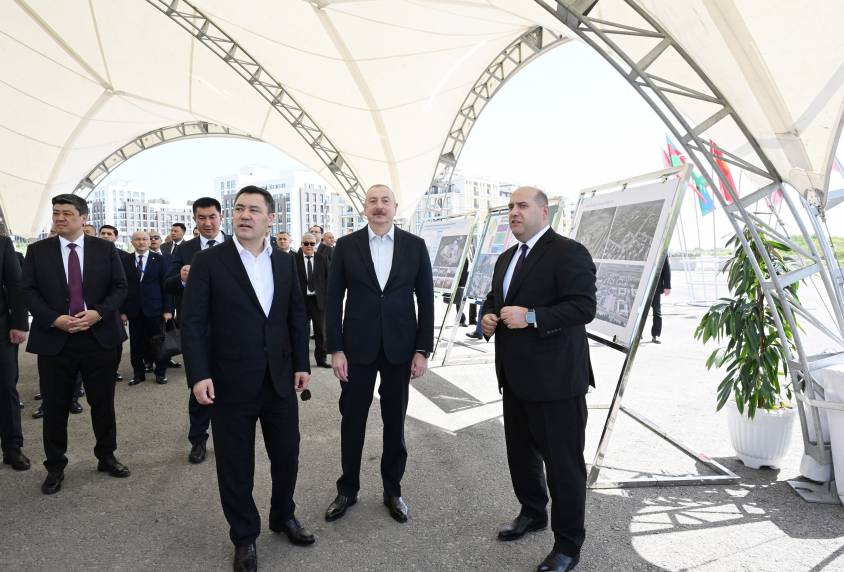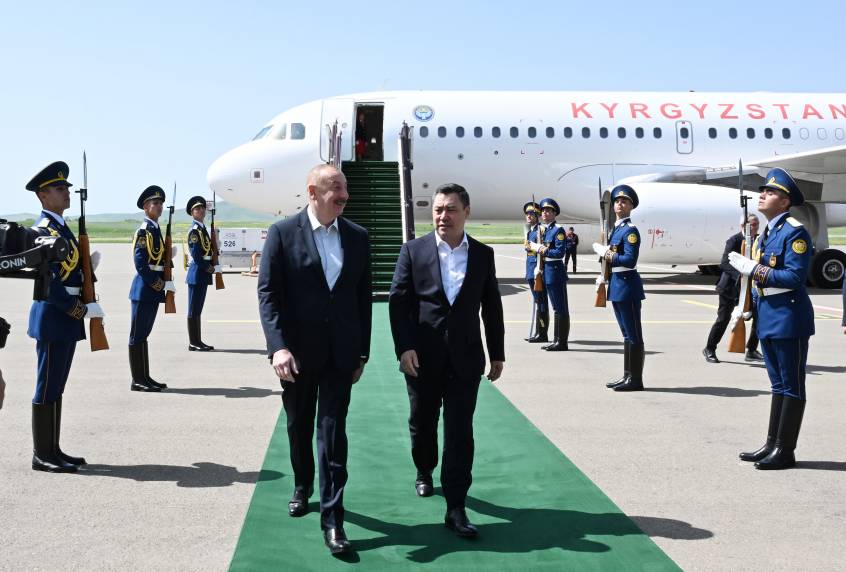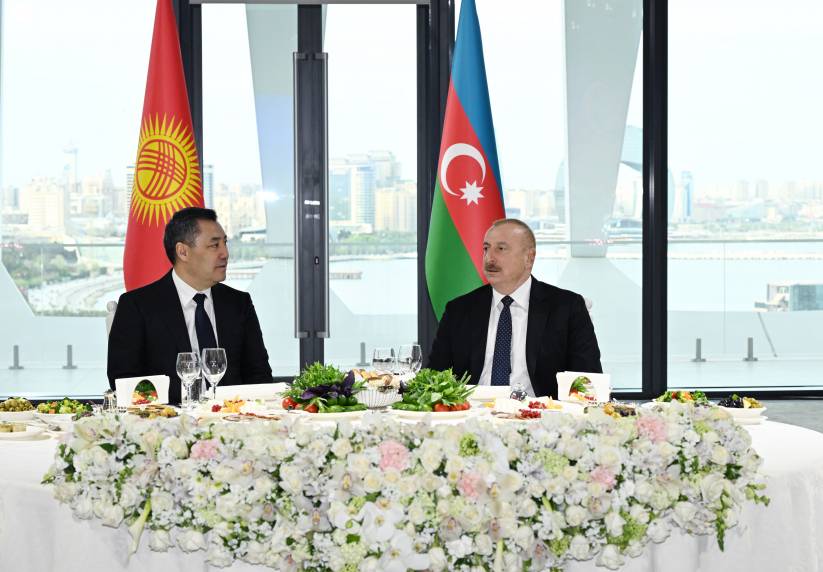16:25
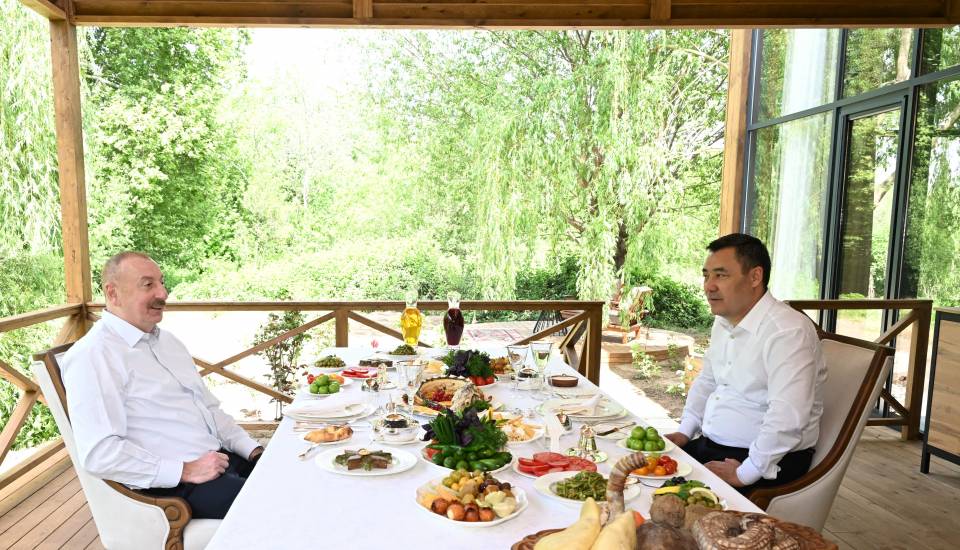
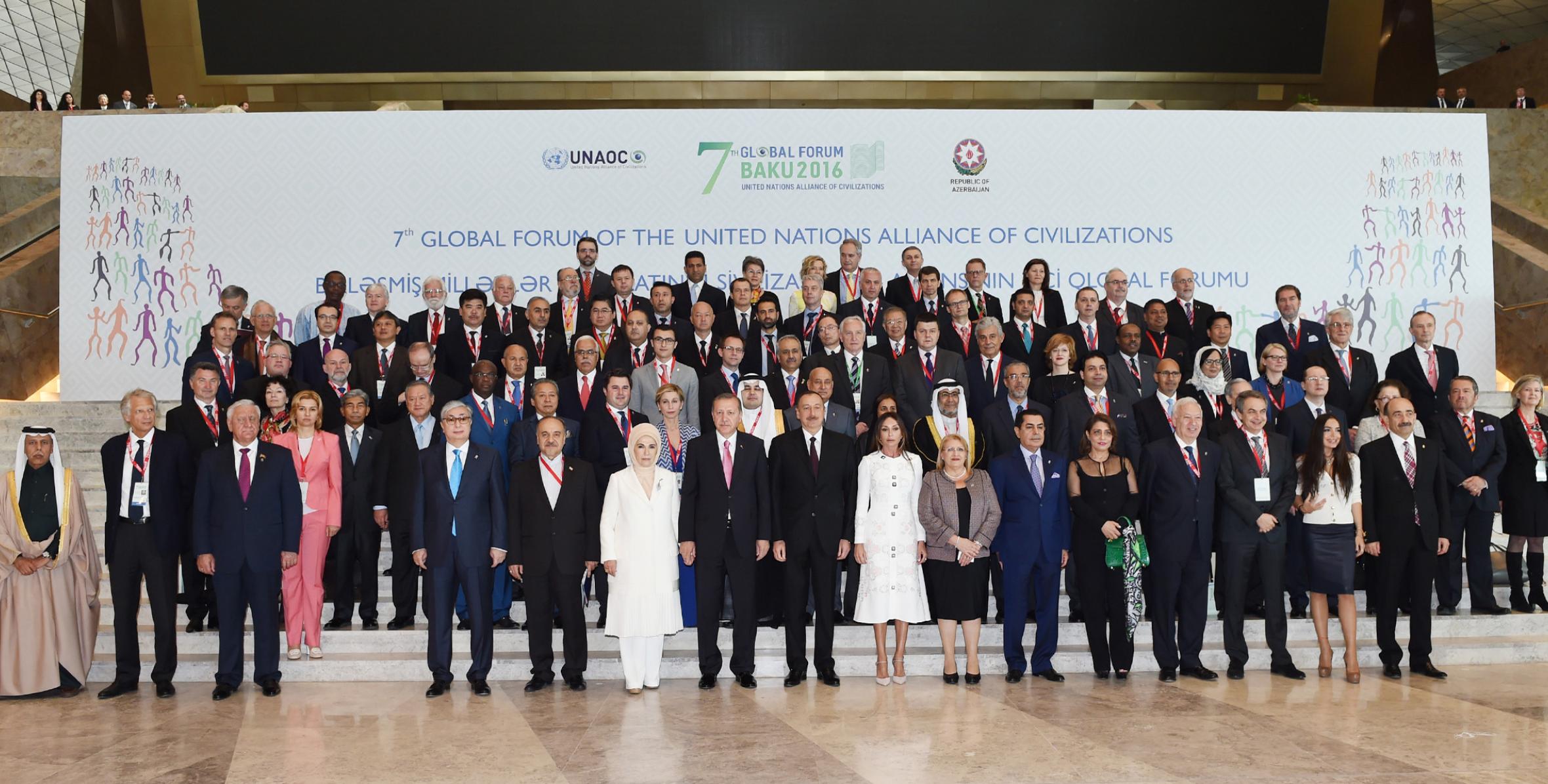
The 7th Global Forum of the United Nations Alliance of Civilizations (UNAOC) on the theme “Living Together in Inclusive Societies: A Challenge and A Goal” has kicked off in Baku.
President of the Republic of Azerbaijan Ilham Aliyev and his wife Mehriban Aliyeva attended the opening ceremony.
The head of state addressed the event.
Speech of President Ilham Aliyev
Excellences,
Presidents,
Dear friends, dear guests.
First of all, I`d like to welcome you all to our country. I am very glad to see you all in Azerbaijan. It is a big honor for us to host the 7th Global Forum of the United Nations Alliance of Civilizations. We consider this as a sign of appreciation of our activity and promotion of the values of intercultural dialogue, multiculturalism.
First of all, I`d like to express my gratitude to the founding fathers of the Alliance – Turkey and Spain, President Erdogan and Prime Minister Zapatero for this extremely important initiative, which now lives for more than 10 years. The idea of creation of the Alliance was a sign of wisdom of the politicians, my brother President Erdogan and Prime Minister Zapatero, and was supported by the international community.
I`d also like to express gratitude to the UN High Representative of the Alliance of Civilizations Mr. Al-Nasser for his leadership and contribution to promotion of the values of peace, solidarity and friendship.
We are very proud that today representatives of more than 140 countries gathered in Baku to address important issues of the Alliance of Civilizations.
Azerbaijan for centuries was a place where religions, cultures, civilizations met. We are not only a geographic bridge between East and West, but also a cultural bridge. For centuries representatives of religions, cultures lived in peace and dignity in Azerbaijan. Religious tolerance, multiculturalism always was present here. There was no word “multiculturalism”, but ideas were always present.
And the result of that is that today Azerbaijan is a multiethnic, multiconfessional country where representatives of all religions and ethnic groups live in dignity and peace. This is one of our biggest assets. And we are proud of our history. We are proud of our historical monuments which reflect the creation of representatives of different cultures.
One of the oldest mosques in the world, which was built in 743 is situated in the ancient Azerbaijani city of Shamakhi. Also one of the oldest churches in the Caucasus, the ancient church of ancient state of Caucasian Albania is also situated in Azerbaijan close to another ancient city of Shaki. Our government invests in construction and renovation of mosques, Orthodox and Catholic churches, synagogues. This is our policy and this is our lifestyle. For centuries Azerbaijan is preserving these assets regardless of political or social situation in our country. Our country is relatively young as an independent country - only 25 years old. But it is an ancient country with deep historical and cultural roots.
Multiculturalism for us is a state policy. We organized different events, addressing these important issues. Every second year the intercultural dialogue forum is taking place in Azerbaijan. We regularly host Baku International Humanitarian Forum. And the main idea is how to bring representatives of different religions together and how to establish more understanding between us.
Azerbaijan hosted the World Summit of Religious Leaders addressing important issues of interreligious dialogue. I think that today this is one of the most important topics on the global agenda. And the role of Alliance of Civilizations is growing. Unfortunately, we see also very concerning trends in our region, in Europe, in Middle East, in the area of former Soviet Union, where we see clashes, confrontations based on ethnic or religious grounds. This is a very dangerous tendency.
And I think that the gathering in Baku, the 7th Global Forum, will address these issues and will contribute to the cause of solidarity, peace, mutual understanding and partnership.
In 2008, we initiated Baku Process, which already became a broad platform for intercultural dialogue. Azerbaijan is one of the few countries which are members of Islamic Cooperation Organization and of the Council of Europe. So, at the meeting of ministers of culture of Council of Europe, which took place in Baku in 2008, we invited ministers of culture of the countries of Islamic Cooperation Organization. For the first time ministers of culture of more than hundred countries of these two organizations gathered in Baku.
Next year, in 2009, we hosted a ministerial meeting of the ministers of culture of Islamic Cooperation Organization in Baku and invited ministers of culture of European countries. So, this process was named Baku Process, and we are very proud that the name of our ancient city is now also associated with this positive initiative. And this process in growing. It is getting more and more supporters, it is becoming a global initiative, which contributes to the cause of solidarity, mutual understanding and intercultural dialogue. At the same time our initiatives are aimed at strengthening positions of our country as a bridge between cultures, between civilizations, as a country, which can and should contribute more to the cause of mutual understanding.
Last year we were very proud to host the first, inaugural European Games in Baku. Next year we will be hosting the 4th Islamic Solidarity Games in Baku. So in one city, in 2 years` time, European and Islamic athletes will perform. And this is not only sports, achievements and medals. This is friendship, this is mutual understanding, this is solidarity, partnership, and there is nothing to divide between us.
We are all living on the same planet. All the people want to live in dignity, in peace, in security, to raise children, to protect their families. All religions advocate for the same values of humanity, mercy, solidarity, peace. Uniting our efforts is what the world needs today. Today`s gathering, today`s Forum is a clear indicator that the ideas of multiculturalism are strongly supported by international community. As I said more than 140 countries are present here.
Multiculturalism has no alternative. Of course, we all know that there are different ideas. Some say that multiculturalism failed or didn`t work. But there are positive examples. For us multiculturalism is a state policy and is our lifestyle.
What are the alternatives of multiculturalism? They are very dangerous alternatives – xenophobia, Islamophobia, anti-Semitism, racism, discrimination, hatred. Therefore, the strengthening of the values of multiculturalism will, I think, be a very positive trend in the current politics. And all the responsible politicians should contribute to these positive dynamics.
As I said, Azerbaijan is a relatively young country as an independent state. This year we will celebrate the 25th anniversary of restoration of our independence. These were the years of transformation of our political, economic system, these were the years of creation of the state. And, I think that we met all our major targets.
Azerbaijan became a respected member of international community, is a member of United Nations, OSCE, Islamic Cooperation Organization, Council of Europe, Non-Alignment Movement and many other international bodies.
We have strong international support, which was reflected in 2011, when with the support of 155 countries Azerbaijan for the first time was elected as a non-permanent member of the United Nations Security Council. That was a big victory of our country and a sign of great respect for Azerbaijan.
Within this short period of 25 years we managed to present ourselves as a reliable international partner, as a country with independent foreign policy, a country which contributes to regional development, regional security, stability and multiculturalism. The years of independence were the years of transformation of our political system, creation of democratic institutions, and we succeeded in that. All the freedoms are provided in Azerbaijan, including freedom of media, free internet - more than 70% of our population are internet users - freedom of assembly, religious freedom. All freedoms are provided, and this is a good foundation for rapid economic development. And economic reforms implemented in Azerbaijan were implemented in parallel with political reforms.
Unfortunately, the creation of our statehood was dominated by military aggression of a neighboring Armenia against Azerbaijan, the aggression that ended in occupation of the internationally recognized territory of our country. Nagorno-Karabakh is a historic part of Azerbaijan, a legal part of Azerbaijan. When Azerbaijan became a member of United Nations, Nagorno-Karabakh was adopted as an integral part of our country. But as a result of this aggression Nagorno-Karabakh is totally occupied by Armenia. And not only Nagorno-Karabakh, but seven other districts of Azerbaijan beyond the administrative borders of Nagorno-Karabakh are under occupation. As a result of that occupation we have more than one million refugees and IDPs. So we were the subject of ethnic cleansing by Armenia. Almost 20% of our territory is under occupation for more than 20 years.
Everything on the occupied territories is destroyed, and OSCE sent two fact-finding missions to observe the situation and their report is terrifying. Everything is destroyed – all our buildings, historic monuments, mosques, graves. Here in Baku, in the center of the city, you can see how we preserve the religious heritage of Armenian people. The Armenian church was restored and is situated where it was built. But all our mosques on the occupied territories lie in ruins.
International community adopted resolutions and decisions in order to put an end to this occupation. United Nations Security Council – the highest international body – adopted four resolutions demanding immediate and unconditional withdrawal of Armenian troops from the occupied territories. Unfortunately, Armenia simply ignores these resolutions, and doesn`t implement them. And here we come to a very important point of the mechanism of implementation of decisions and resolutions of international organizations. In some cases, resolutions of Security Council are being implemented within days, if not hours. But in our case it is more than 20 years and it is still unresolved.
OSCE, Islamic Cooperation Organization, Parliamentary Assembly of the Council of Europe, Non-Alignment Movement – all of them adopted similar resolutions demanding withdrawal of Armenian troops from Azerbaijani territory. But Armenia simply ignores them, and there is no international pressure to force the aggressor to comply with international norms.
Our people were subject of genocide. Khojaly genocide is recognized by 10 countries. As a result of that genocide hundreds of Azerbaijanis were killed, all of them civilians, and almost 200 of them women and children. This is a crime against humanity, and this once again shows what a danger we are facing now.
The resolution of the conflict between Armenia-Azerbaijan must be based on the international law norms, United Nations` Charter, Security Council`s resolutions, Helsinki Final Act. Our territories must be liberated, our people must have a chance to go back to their homes.
In the beginning of the 1990s we faced a major humanitarian catastrophe. Because we had 250,000 Azerbaijani refugees from Armenia. And more than 700,000 internally displaced persons from Nagorno-Karabakh and other areas. At that time population of Azerbaijan was less than 8 million. So we had probably one of the highest per capita numbers of refugees and IDPs.
And we know how difficult it is to accommodate them, to provide decent conditions for them. Especially, at that time, we were completely without any resources. We were at that time one of the poorest countries in the world with a living standard below any level of poverty. Of course, we got some international support, but we mainly coped with this issue ourselves.
Despite of the fact that we built 90 settlements and every year we resettle more than 20,000 refugees and IDPs, still some of them live in difficult conditions, in dormitories, in schools, in kindergartens. And we are trying to do all our best to improve their living standard, but it takes a lot of time. So we clearly understand the situation, which countries now face with respect to refugees. This is a real humanitarian catastrophe, and all international community should take part in the resolution of these issues. And the countries, which receive most of the refugees, now need to be supported. Not only by words, but very serious financial contribution. As a country which suffered and continues to suffer from occupation, we know how difficult it is from all point of views, from political, moral, economic and social points of view.
Despite occupation our country develops. We had one of the fastest economic growth rates in the world in the decade from 2004 to 2014. We dramatically reduced poverty from almost 50% to 5%. Unemployment also is around 5%. We invest in education. Level of literacy in Azerbaijan is close to 100%. More than 3000 schools were built and renovated in the recent years. More than 500 hospitals were constructed all over the country. It allowed us to reduce significantly the child mortality. Gender equality is fully protected in Azerbaijan. Women have a right to vote in Azerbaijan for almost 100 years since the creation of the first Democratic Republic of Azerbaijan in 1918. By the way, that was a first Democratic Republic in the Muslim world.
We invest in environmental protection, especially in Absheron Peninsula, which had a lot of polluted areas due to the oil exploration and development. We had to clean all that polluted areas and create parks and public areas there. In other words, we are making a very important progress with respect to United Nations Millennium Development goals, and we are on a right track. Even the economic crisis, which all the oil producing countries are facing now especially taking into account the reduction of oil price, did not seriously affect our economy. And I am sure that we will be able to achieve all our major goals in 2016.
Azerbaijan is known as a country rich with energy resources. But our main objective is to transform “black gold”, as we call oil, into human capital. Therefore, investment in education, social protection, reforms brought to the result that our economy is now diversified, and dependence on oil and gas is going down.
Though, of course, we initiated large-scale energy projects. The project of Southern Gas Corridor, which is a project of energy cooperation and energy security. Also we are an active member of the team of countries in promotion of the transportation corridor taking into account our geographical location. And if you look at the number of countries, I will name them, if you don`t mind, just to demonstrate what kind of regional cooperation we have. It will be clear that these energy and transportation corridors are not only corridors for energy and cargos. These are the corridors of partnership. Southern Gas Corridor members are Azerbaijan, Georgia, Turkey, Bulgaria, Greece, Albania, Italy and also Balkan countries, I am sure will join at a later stage.
East-West corridor, Silk Route project was initiated by three countries – Azerbaijan, Georgia and Turkey. And now it expands to Central Asia, China, and from Turkey to Europe. This will be a new Silk Route. And then North-South corridor, where Azerbaijan is also an active participant. Here we have countries of Northern Europe, Russia, Azerbaijan, Iran, Pakistan and India.
These are projects of partnership because all these countries have become interrelated. And if you are interrelated, if you are interdependent on each other then you have more predictability, stability, security and cooperation. Creation of this format of international cooperation is based on economic interests, like energy security and transportation, is based on sharing the same values of how to overcome the difficulties, how to create better conditions for our people. And as a foundation of all that our common values of religious tolerance, mutual understanding, multiculturalism will make the life of the people of our region better.
Once again I would like to express my gratitude to all our guests, who are together with us today. Thank you for being with us at this important event.
I`d like to wish the Forum success. Thank you very much.
X X X
Then the United Nations High Representative for the Alliance of Civilizations Nassir Abdulaziz Al-Nasser made a speech.
Secretary General of the United Nations Ban Ki-moon addressed the forum via video conference.
Then Spanish Minister of Foreign Affairs José Manuel García-Margallo and Turkish President Recep Tayyip Erdogan made speeches.
The forum brings together more than 3000 delegates, including heads of state and government, high-level officials, politicians, public figures, representatives of leading international organizations and think tanks, and scientists.
The organizers of the forum include UNAOC, UNESCO, UNWTO, ISESCO and Council of Europe.
